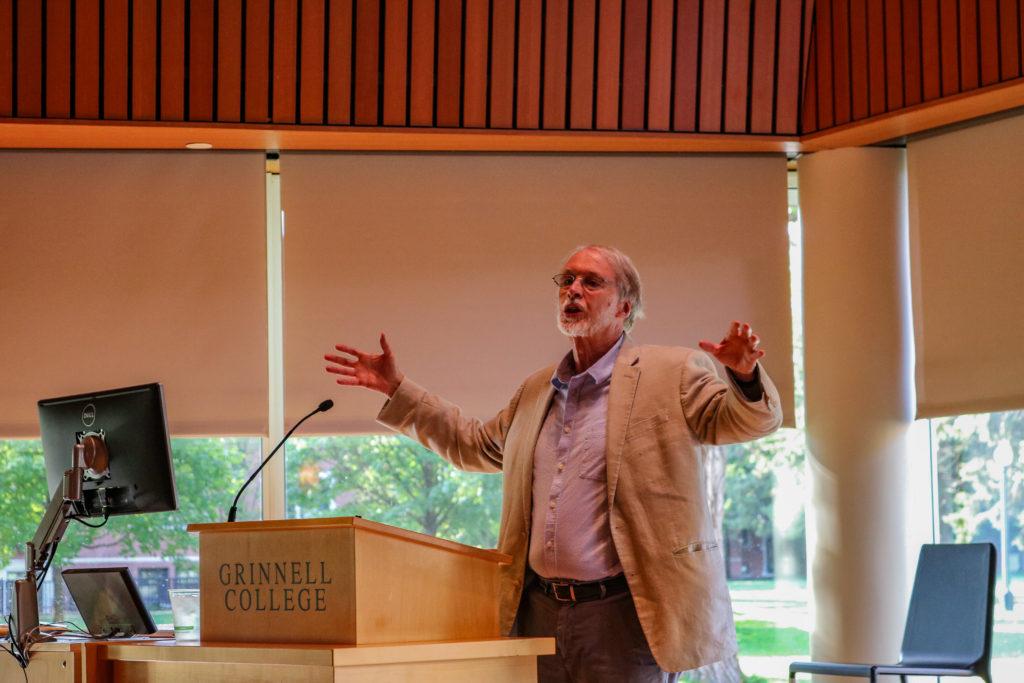 National Book Award finalist Charles Baxter speaks in JRC 101 on Sept. 23. Photo by Isabel Torrence.
National Book Award finalist Charles Baxter speaks in JRC 101 on Sept. 23. Photo by Isabel Torrence.
On Monday Sept. 23, successful essayist and novelist Charles Baxter visited campus to give a craft lecture and reading. He introduced the attendees of his lecture to the concept of a “request moment,” which plays a significant role in his latest novel “There’s Something I Want You to Do.”
He explained the request moment as a situation in which a person or persons do something unusual, unethical or potentially unsafe because of transferred desire. The moment comes with a condition such as, “If you love me, you’ll do this for me” and tends to be presented as pressing to create dramatic tension within a work.
There were two experiences that enabled Baxter to develop this theory.
“Partly being a younger brother and being ordered around and then going to some Shakespeare plays and noticing how often they start with request moments: Macbeth, Hamlet, King Lear,” said Baxter.
He thought it “was something that was completely obvious and that nobody had noticed before.”
To help the audience fully understand the concept, Baxter prudently picked the works Hamlet, King Lear, Macbeth, The Godfather, Silver Dagger and A Shropshire Lad to build his analysis on.
“I wanted to find examples that most people knew. There are plenty of examples from more obscure stories that not everyone might have read, but I thought that a lot of people have seen the Godfather, a lot of people have read these Shakespeare plays,” Baxter said.
A few hours later, Baxter followed up his lecture with an animated reading of his novel, “The Sun Collective,” which he has been in the process of writing for the past five years and aims to release early next year.
Baxter wrote his debut novel “First Light” in 1987 and after the “The Sun Collective” is released, he will have published a total of six novels.
Amongst the novels, his book “Feast of Love” was nominated for the National Book Award for Fiction in 2000 and adapted into a film in 2007.
Despite these accomplishments, Baxter expressed uncertainty about his status as an author.
“I was never sure. I still am not sure … by the time I was in my late twenties, maybe my early thirties, I wasn’t sure that I was an author but I really knew I wanted to write and I knew how hard it would be to make a life as a writer but I wanted to try and by the time I was in my thirties, I was really determined to try,” Baxter said.
According to Baxter, new writers will start writing their novels by following the canon of authors they admire until they eventually find their own style.
“You sort of learn how to write stories or novels by doing that—by imitating. But after you’ve done that maybe for a couple of years, you begin to find ways of writing that are not exactly like anybody else’s—you hope, you hope it doesn’t look like other people’s work—and you’re not imitating anymore. You’re not copying anybody. It comes from here and it comes from here,” Baxter said, as he gestured to both his heart and his head.
Baxter shared that readers can benefit from the content in his novels because they cannot only live vicariously through them, but learn from the characters’ experiences.
“I always think a novel should give you some sense of what people do and should take you away from your life into a kind of story world where it’s fun to be, and you sort of forget what’s going on in your own life,” Baxter said.
“I mean, when you’re young, you love to hear stories because the stories are telling you what human beings are capable of and what they do.”






















































